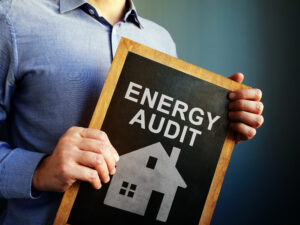What do world events, climate change events, and the ongoing pandemic all have in common? If you ask the experts, they’re all driving up the cost of utilities. According to reports, natural gas is up nearly 25 percent from a year ago and electricity is up about 10 percent. While the significance of increases is largely dependent based on location, there’s no denying that costs are on the upswing – and only projected to tick higher in the coming months.
So what can a property do to conserve energy and keep utility costs in check? Practicing energy management and some of the strategies that fall under this umbrella is one sure-fire way to reduce utility costs and increase your bottom line. In this post, we’ll take a closer look at energy management, energy audits, and how they can help your property achieve new levels of sustainability.
What is Energy Management?

Simply defined, energy management is the process of both tracking and optimizing the way energy is consumed in a commercial property to help reduce costs. Think of energy management as a strategy for conserving energy and reducing costs. There are many parts and pieces to this strategy, including conducting an energy audit, which we’ll get into later on in this piece.
So why does energy management matter? As we mentioned, adopting this sort of strategy can help you reduce costs – sometimes as much as up to 25 percent, which can represent significant savings. These cost savings can help improve your bottom line and free up money in the budget to invest in other areas of your business.
Additionally, a robust energy management policy can also help reduce carbon emissions to meet any defined organizational sustainability goals and/or regulatory requirements. As more consumers are paying attention to a company or brand’s sustainability efforts when making purchasing decisions, adopting energy management strategies can also prove to be a good marketing tool for your business. It can become a talking point when working to earn new business and put your firm in a more favorable light with suppliers and other partners. Potential employees may also take note of your commitment to energy savings and be more interested in working for your firm when compared to a competitor that may not have the same commitment.
What is an Energy Audit?

While energy management is the overall strategy behind monitoring and conserving energy, an energy audit is often the practical first step that firms use to help execute any energy management improvements. An energy audit is a thorough process that involves assessing energy consumed in a property (including the bills), identifying any inefficiencies, and then recommending changes that can be implemented. Think of it like this: Before you can optimize your facility’s energy, you need to study it and know where improvements can be made. An energy audit is designed to offer these areas for improvement, without impacting the performance of the facility.
Energy audits are conducted by professional auditors or advisors. They tend to consist of a thorough walk-through of a property and the analysis of specific aspects, such as:
- The HVAC system
- Insulation
- Door and window sealing
- Airtightness
- Appliances
- And more
An energy audit may also consist of utility bill analysis to see if there are any applicable rate adjustments that can be carried out. This is known as an energy bill audit. Conducting an energy audit with your utility bills can help you stay compliant while also making sure you are billed correctly. In some cases, an auditor will even negotiate on your behalf with the utility company to ensure you are getting the right rates or a lower rate than what you may be currently paying.
When complete, you’ll receive a detailed report that identifies inefficiencies and makes recommendations to correct such issues to better conserve energy and save money. In addition to helping a property conserve energy, energy audits also help identify safety issues within a property, notably when it comes to electrical systems and ventilation.
What Comes After an Energy Audit
At the end of an energy audit, property owners will receive a detailed report of what was found and steps that can be taken to streamline efficiency. As is the case for most things when it comes to energy efficiency, it’s not one big thing that does the trick, but a number of small things that all add up over time. Some common implementation strategies following an energy audit may consist of:
- Installing high-efficiency HVAC systems and components
- Installing LED lights
- Installing motion-sensing lights and/or thermostats
- Improving insulation
- Replacing aging appliances or equipment with Energy Star-certified upgrades
- Fixing any air leaks or drafty areas
- Upgrading to efficient doors and windows
- Making billing adjustments
Depending on how many of the auditor’s suggestions are implemented, properties can improve energy efficiency by up to 30 percent. In some cases, such as those where a capital investment is necessary, various aspects of the energy audit may be implemented over the course of several years.
Differences Between Energy Management and Energy Audit
The biggest difference between energy management and an energy audit is that the former is a strategy, while the latter is a specific part of executing the strategy. Energy management is a long-term strategy or goal that’s dedicated to continuous energy efficiency, while an energy audit is typically something that only happens once or only happens once every few years (at most) if progress and improvement need to be tracked. In other words, you don’t typically have an energy audit performed if you’re not already under an energy management mindset.
Contact Us Today
For more information on the key differences and the relationship between energy management and an energy audit, contact Green Line Rates today. We’re committed to helping you save energy through a variety of energy management solutions. Contact us today for more information.
